Libya coach Martins admits the pressure is onpublished at 10:07 BST 30 May 2022
Libya's new coach Corentin Martins says he needs to pick up positive results in 2023 Africa Cup of Nations qualifiers this month.
Read MoreLibya's new coach Corentin Martins says he needs to pick up positive results in 2023 Africa Cup of Nations qualifiers this month.
Read More Image source, Getty Images
Image source, Getty ImagesA new UK visa scheme that is designed to attract the "brightest and best" graduates from around the world does not include any African universities on its list of institutions where those degree-holders can come from.
This has led to some complaints that African talent is being excluded - though Africans who have attended the listed universities will be able to apply.
The UK scheme will be available to alumni of the top non-UK universities who graduated in the past five years.
Graduates will be eligible regardless of where they were born and will not need a job offer in order to apply.
But the way the list of top global universities has been drawn up has meant that not a single African tertiary institution is listed.
To qualify, a person must have attended a university that appeared in the top 50 of at least two of the Times Higher Education World University Rankings, the Quacquarelli Symonds World University Rankings, or The Academic Ranking of World Universities in the year they graduated.
Thirty-seven universities have made the list - most are in the US, but there are also some in Europe and Asia.
“These ratings are based on criteria that favour universities which have been around for hundreds of years and have access to a lot of funding,” Amina Ahmed El-Imam at the University of Ilorin in Nigeria told the New Scientist magazine, external.
“As someone from Nigeria who did their PhD in Britain, it’s heartbreaking to see that there are still processes being put in place that inadvertently exclude Africans,” she said.
“Does this visa mean that there are no individual graduates from African universities with high potential?”
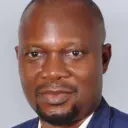 Chris Ewokor
Chris Ewokor
BBC News, Abuja
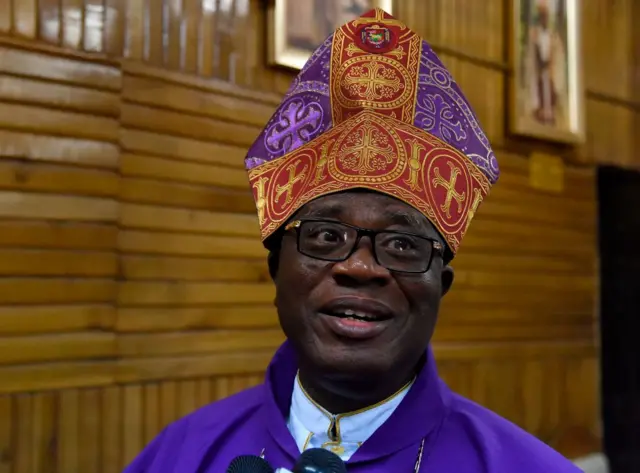 Image source, AFP
Image source, AFPThe head of the Methodist Church in Nigeria, Samuel Kanu, was kidnapped on Sunday in Abia state, south-east Nigeria, alongside two other clerics.
Police in the state say a manhunt has been mounted to rescue the priests.
In Nigeria, the Methodist Church is one of the established evangelical churches.
Separatist groups have been active in the south-east region where they have been agitating for a breakaway state from Nigeria.
Recently, a local MP was kidnapped by unknown gunmen. His headless body was found days later.
A military couple was also beheaded as they travelled to the region to inform their relatives about their plans to wed.
Separately on Sunday morning, a young woman and her brother were abducted when gunmen invaded their residence in Lafia, Nassarawa state, near the capital, Abuja.
Their father was shot dead during the attack.
There’s been a resurgence of attacks by armed gangs including jihadist militant groups as Nigeria prepares for a general election next year.
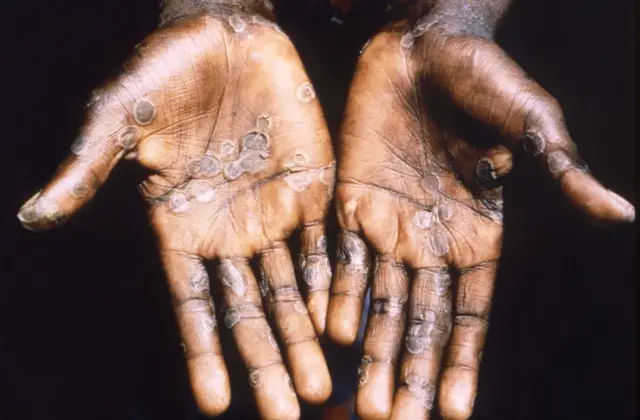 Image source, Getty Images
Image source, Getty ImagesMonkeypox symptoms include an itchy rash and lesions mainly on hands and feet
Nigeria has recorded six monkeypox cases in May from four states, the country's Centre for Disease Control (CDC) said late on Sunday.
The cases were reported in the states of Bayelsa (two), Adamawa (two), Lagos (one) and Rivers (one).
In total, the country has confirmed 21 cases since the start of the year with one death reported - a 40-year-old patient.
The cases were reported in nine states and the capital, Abuja.
The CDC said there was a case of a visitor who "exported monkeypox from Nigeria" to the UK. The case was detected on 6 May by British authorities.
Outbreaks of the virus have been found in Europe, Australia and America.
The symptoms often include a fever and rash - but the infection is usually mild.
Read more:
Emery Makumeno
BBC News, Kinshasa
A military spokesman in eastern Democratic Republic of Congo says two Rwandan soldiers were captured by villagers, just a day after Kigali claimed they were captured by pro-government rebels.
The Rwandan soldiers - Élysée Nkundabagenzi and Ntwari Gad - were captured by residents of Bwisha chiefdom, about 20km (12 miles) away from the border, according to Gen Sylvain Ekenge.
He claimed the two soldiers entered DR Congo last Wednesday to attack the Runangabo military camp before they were captured by residents.
On Saturday Rwanda said the two soldiers were being held captive in eastern DR Congo by the Rwandan Hutu FDLR militia, which it says gets support from Kinshasa.
DR Congo has ramped up its offensive against the M23 rebels in North Kivu province.
The rebels, who had been driven out of DR Congo in 2013, have regrouped and retaken strategic areas.
Rwanda has deployed troops to its borders with DR Congo because of the clashes.
The head of the African Union, President Macky Sall of Senegal, has expressed "grave concern" at rising tensions between the Democratic Republic of Congo and Rwanda.
Youssef Taha
BBC World Service News
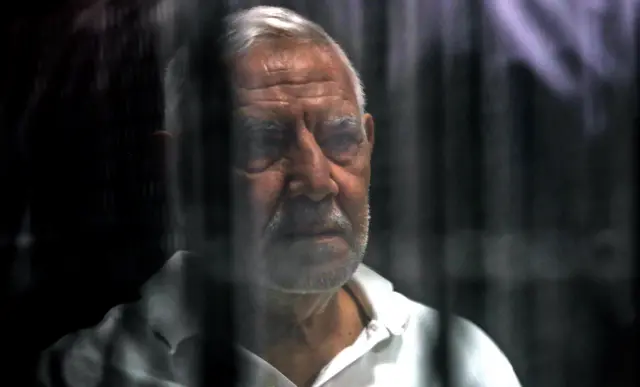 Image source, AFP
Image source, AFPAbdel Moneim Aboul Fotouh is 70 and in poor health
A criminal court in Egypt has sentenced a former presidential candidate to 15 years in prison with hard labour.
Abdel Moneim Aboul Fotouh, who is 70 and in poor health, was convicted along with an interim leader of the proscribed Muslim Brotherhood group, Mahmoud Ezzat, of disseminating fake news and joining a terrorist group - both are blanket charges.
Mr Aboul Fotouh was arrested in 2018 upon his return from Britain.
While in London, he gave several media interviews in which he criticised President Abdul Fattah al-Sisi's rule.
The defendants can appeal their sentences.
Naresh Kaushi
BBC World Service News
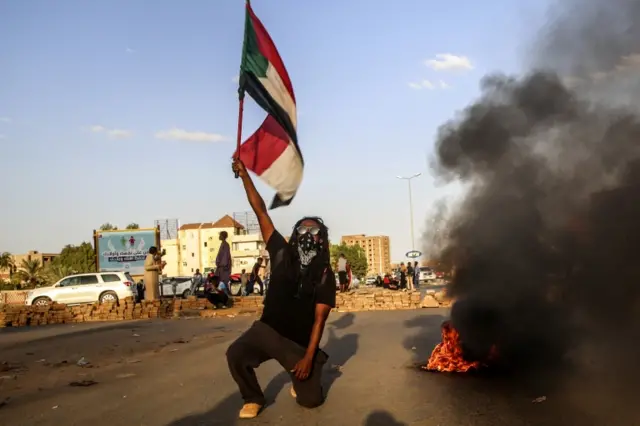 Image source, EPA
Image source, EPAProtests have continued since the coup
Sudan's military government has lifted a state of emergency which it imposed after seizing power in a coup six months ago.
The country's ruling security and defence council said the decision was made at a meeting headed by the military leader, General Abdel Fattah al-Burhan.
It said the move was aimed at creating the right atmosphere for dialogue.
Protests against the military government have continued since the coup in October.
Clashes with police have killed nearly 100 people since then.
In recent days security forces have arrested many protesters, targeting the leaders of the resistance movement.
Read more:
Our proverb of the day:
Quote MessageOne cannot repair a fallen tree."
A Beti proverb sent by Sandrine Mengue Essomba in Yaoundé, Cameroon.
What sparks a poem? How long does it take for an idea to become a poem? In a dynamic series of very personal essays, Inua Ellams shares his own experience of creating poetry, taking the listener on five vivid and varied journeys. Each essay culminates in a poem taken from his most recent collection, The Actual.
Inua sets out the starting point and context for a poem, unpicking his relationship to its central motifs and themes, drawing on a wide range of social and cultural references. The series offers an in-depth and personal exploration of the process of creating individual poems from an award winning young poet. Poetic Provocations invites the listener into a poet’s mind and process with refreshing honesty, warm wit, political analysis and insight.
Born in Nigeria in 1984, Inua Ellams is an internationally touring poet, playwright, performer, graphic artist and designer. He is an ambassador for the Ministry of Stories and his published books of poetry include Candy Coated Unicorns and Converse All Stars, Thirteen Fairy Negro Tales, The Wire-Headed Heathen, #Afterhours and The Half-God of Rainfall – an epic story in verse. His first play, The 14th Tale, was awarded a Fringe First at Edinburgh International Theatre Festival and his fourth, Barber Shop Chronicles, sold out two runs at England’s National Theatre. He is currently touring An Evening with an Immigrant and working on various commissions across stage and screen. He founded the Midnight Run in London, a nocturnal urban excursion, and is a Fellow of the Royal Society of Literature
Essay 5: Kenyan Barber Shop Chronicles
Inua’s play, Barber Shop Chronicles, was a huge success, touring non-stop for three years across the US and UK and streamed to half a million people during the first lockdown. However, it was never meant to be a play. The initial idea was to write a sequence of poems about barbers and their clients, about the need for safe spaces where men can be vulnerable. Inua travelled to six African countries, returning with 60 hours' worth of recorded interviews, yet one whole country, Kenya, was cut from the play. In this final essay, Inua revisits the Kenyan recordings and the men he met there, which gave rise to a final poem, the only one he has ever written about barber shops.
Essayist, Inua Ellams Producer, Polly Thomas Exec producer, Eloise Whitmore
A Naked Production for BBC Radio 3
[Photo credit: Danny Kasirye]
What sparks a poem? How long does it take for an idea to become a poem? In a dynamic series of very personal essays, Inua Ellams shares his own experience of creating poetry, taking the listener on five vivid and varied journeys. Each essay culminates in a poem taken from his most recent collection, The Actual.
Inua sets out the starting point and context for a poem, unpicking his relationship to its central motifs and themes, drawing on a wide range of social and cultural references. The series offers an in-depth and personal exploration of the process of creating individual poems from an award-winning young poet. Poetic Provocations invites the listener into a poet’s mind and process with refreshing honesty, warm wit, political analysis and insight.
The essayist
Born in Nigeria in 1984, Inua Ellams is an internationally touring poet, playwright, performer, graphic artist and designer. He is an ambassador for the Ministry of Stories and his published books of poetry include Candy Coated Unicorns and Converse All Stars, Thirteen Fairy Negro Tales, The Wire-Headed Heathen, #Afterhours and The Half-God of Rainfall – an epic story in verse. His first play, The 14th Tale, was awarded a Fringe First at Edinburgh International Theatre Festival and his fourth, Barber Shop Chronicles, sold out two runs at England’s National Theatre. He is currently touring An Evening with an Immigrant and working on various commissions across stage and screen. He founded the Midnight Run in London, a nocturnal urban excursion, and is a Fellow of the Royal Society of Literature
Essay 2: Kipling / Kipling’s legacy
Inua considers Kipling’s poem ‘The White Man’s Burden’, the invention of race and racism, how its myth was evidenced in philosophy and biology in an endeavour to prop up the colonial enterprise and the slave trading industry, and how these beliefs still play out in the world, during the pandemic, across countries and cultures and in the death of George Floyd. As institutions struggle to, or refuse calls to, decolonise or make more inclusive programmes, it is left to artists and writers to undermine and critique, and Inua’s final tongue-in-cheek poem, fantasising about Kipling’s death, serves that very function.
Essayist, Inua Ellams Producer, Polly Thomas Exec producer, Eloise Whitmore
A Naked Production for BBC Radio 3
[Photo credit: Danny Kasirye]
After sustaining life-changing injuries from an IED explosion in Afghanistan, Billy was assisted by an injured veterans charity who specialise in using motorsport to help with the rehabilitation process. Some years later, it’s time to give something back to that charity. Billy, Titch and John are heading to the stunning landscape of Morocco to assist with a 1,100km desert expedition for 20 injured and sick veterans. Their role is to prepare and maintain the buggies and bikes that the veterans will be riding and help lead the group over the arduous desert route.
But before they head off, Titch, who can never resist a freebie, has saved a dilapidated piece of nautical history from the skip - a 1950s microsized sailboat called a SailFish, which was rather unkindly known in its day as the ‘ironing board of the sea’. With some TLC, Titch restores the craft to its former glory – in time for a wager with Billy, who has bet that Titch can’t master the skills necessary to sail the tiny boat around Brownsea Island. Despite being ex Special Boat Service, sailing microyachts was never part of the job description, and Titch finds himself out of his depth. But with the loser having to run across the Twin Sails Bridge, naked Titch pulls out all the stops to try to win the wager.
Born and raised in Martinique, Frantz Fanon fought for the Free French Forces against the Nazis, and then devoted his life to the liberation of Algeria from France. Fanon was a psychiatrist and author of two acclaimed anti-colonial works: Black Skin, White Masks, and The Wretched of the Earth. He is the choice of the writer and broadcaster Lindsay Johns, who explains why his connection to Fanon is not just intellectual and moral, but also personal. And from Paris, the Frantz Fanon expert, Françoise Vergès, offers her analysis of his life and work.
The presenter is Matthew Parris and the producer for BBC Audio in Bristol is Chris Ledgard Image: Archives Frantz Fanon / IMEC
The coronavirus has changed almost everyone’s lives and for some losing their jobs has led to homelessness. Edward in the United States had to sleep in the New York subway and train stations before finding help from a mission, while Walter spent five months homeless in South Africa - even for a stint, on the famous Table Mountain. Host Nuala McGovern also hears how families in Rome are approaching the renewed restrictions. Nuala also considers the future workplace and how the pandemic has been good for robots.
The author Chibundu Onuzo nominates the first elected female in Africa, Constance Agatha Cummings-John.
Chibundu discovered the remarkable story of Constance while studying for her PhD. Born into the Sierra Leonean Krios elite in 1918, Constance was brought up in colonial Freetown, with a lifestyle which most resembled English gentility.
But everything changed for her when she travelled to England and America as a teenager. She experienced racism and segregation for the first time, and returned to Sierra Leone determined to fight the colonial rule of the British.
At just 20 years old she became the first female elected councillor in Africa, and later the mayor of Freetown. But following independence, she would find herself in exile in London.
Matthew Parris is joined by Chibundu and Constance's grandson, Dennis Cummings-John, to discuss prejudice, class and colonialism, through the inspirational story of a woman ahead of her time.
Producer: Polly Weston
First broadcast on BBC Radio 4 in September 2019.
At the 1992 Olympics in Barcelona, the South African middle-distance runner Elana Meyer was her country's best hope for its first gold medal since returning to international sport following the end of Apartheid. In a dramatic race, Meyer ended up finishing second but, in a moment that became a symbol of African unity, the white South African immediately embarked on a victory lap hand-in-hand with the Ethiopian winner, Derartu Tulu. Elana Meyer talks to Claire Bowes.
PHOTO: Elana Meyer leading Derartu Tulu in the Olympic final (Getty Images)
In 1980, the newly independent nation of Zimbabwe was invited to enter a women's hockey team at the Olympic Games in Moscow. Despite their unfamiliarity with the pitches - and each other - the players won an unexpected gold medal and were nicknamed the Golden Girls. Claire Bowes talks to Liz Chase, one of the Zimbabwean team.
PHOTO: The Zimbabwean team arrive home to an ecstatic reception (AP).